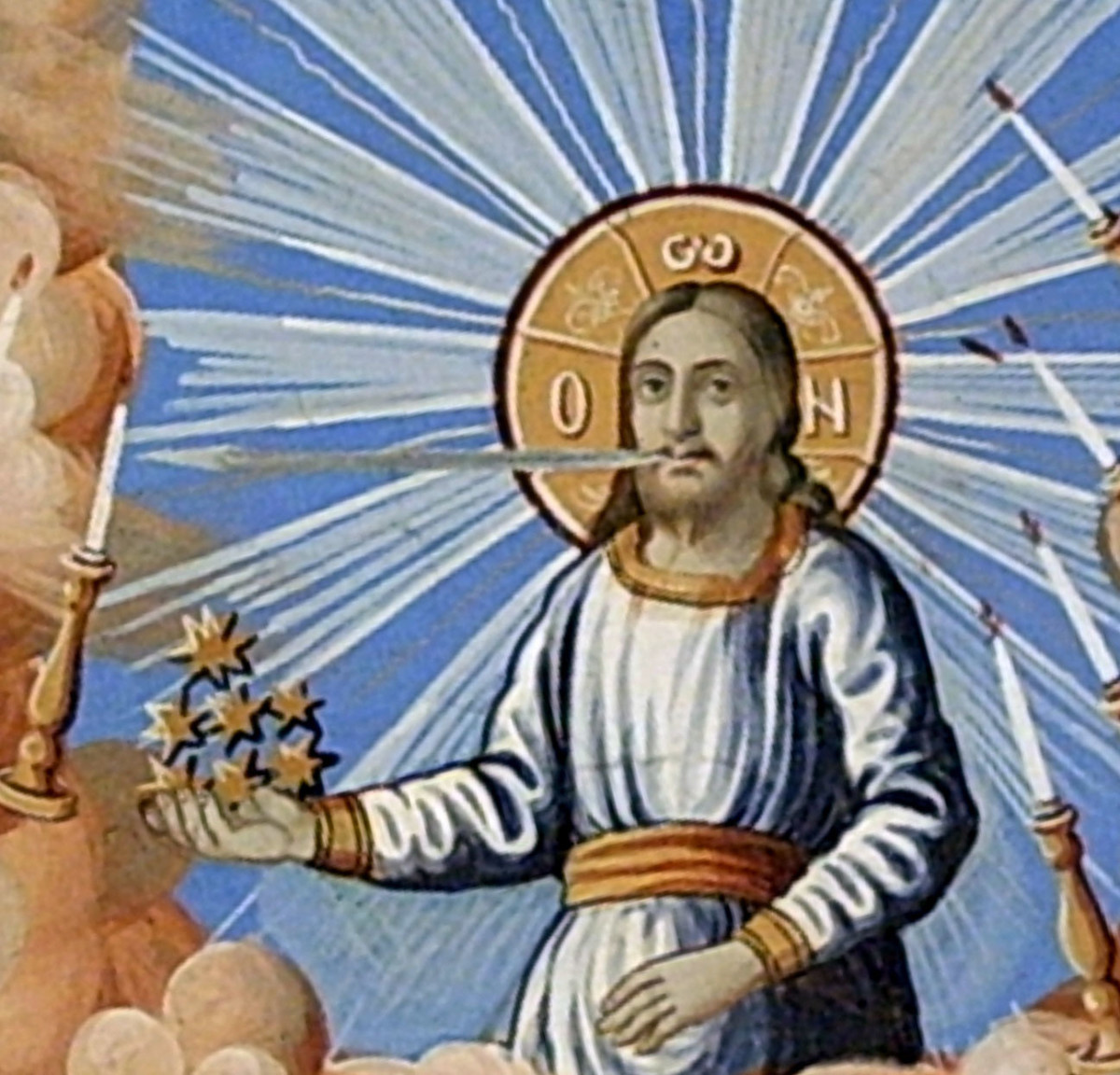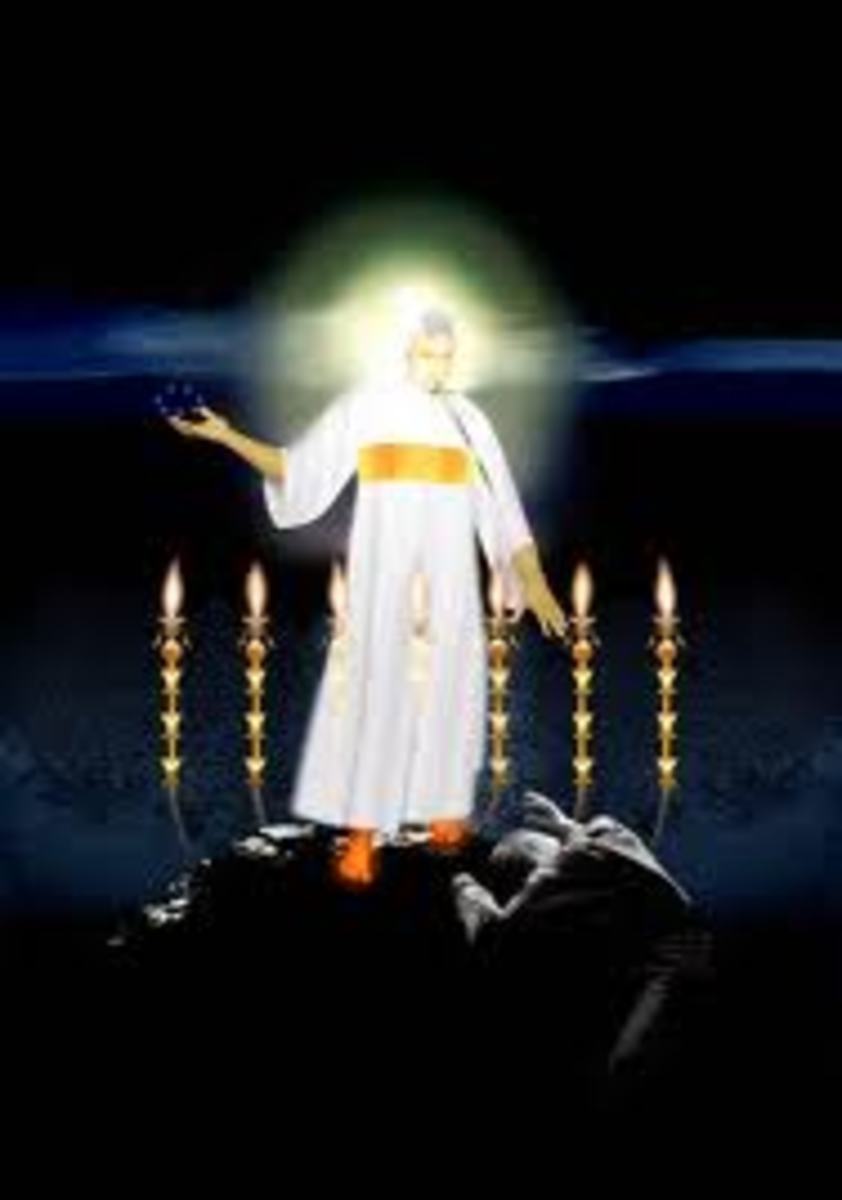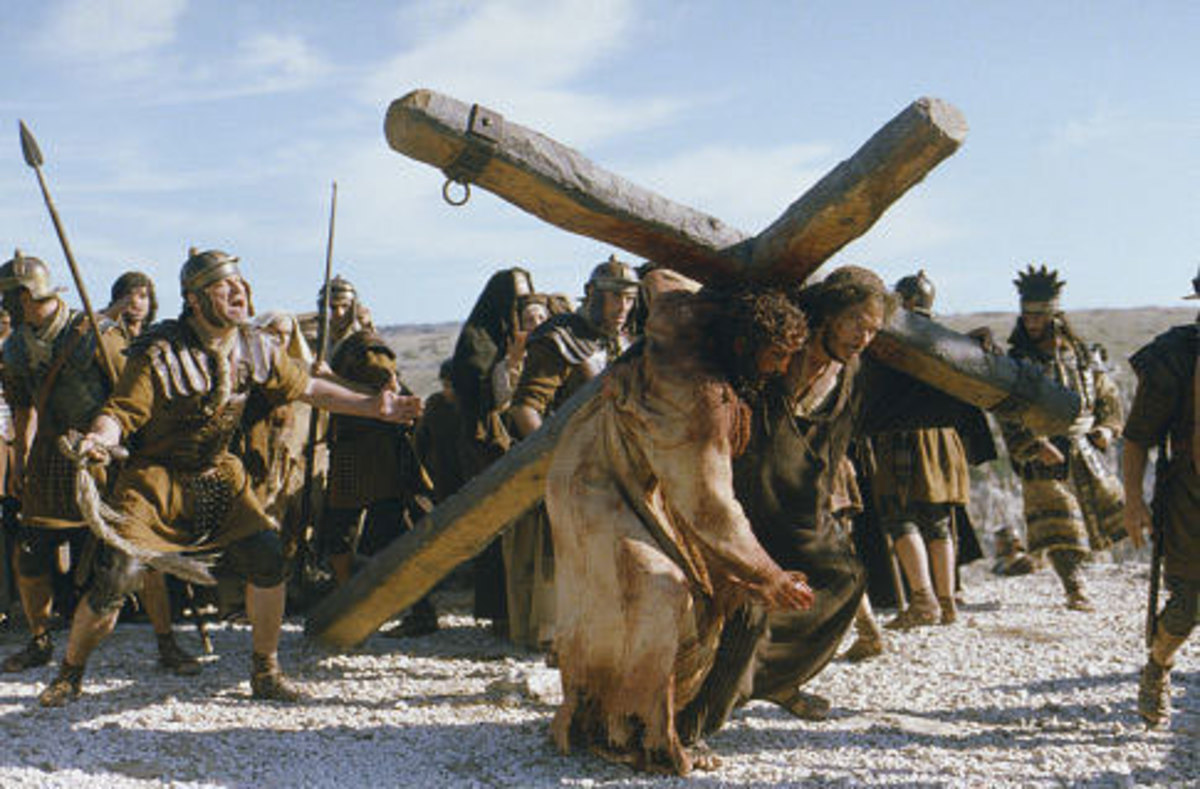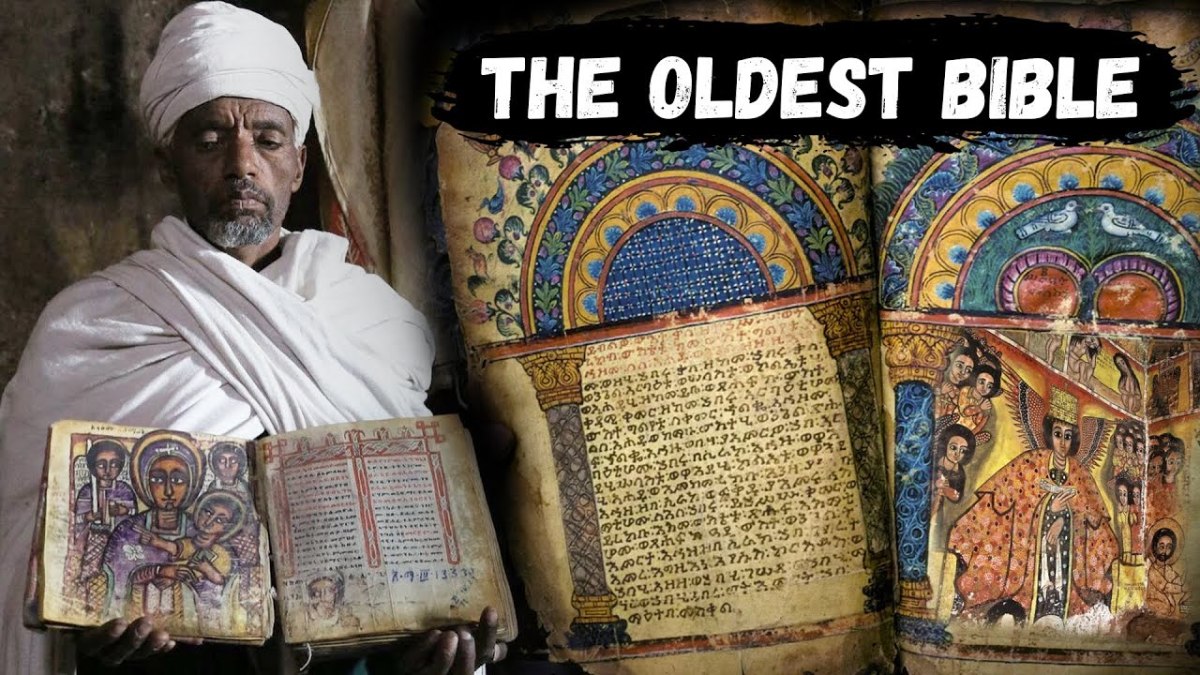Revelation's Greetings

Revelation Series: Episode IV
The Greeting
♰ 1:4 John to the seven churches which are in Asia: Grace be unto you, and peace, from him which is, and which was. and which is to come; and from the seven Spirits which are before his throne, ...
"John to the seven churches which are in Asia." ∼ The Revelation is a letter written to seven particular congregations located in Asia minor. Although this manuscript begins as an epistle (and also ends as one) it soon transcends that form and steps forward as a masterpiece of apocalyptic writing. We are given a hint that it would do just that, in the word esēmana (signified) of v1.
The seven churches in view here are named in v11 of this chapter. They were all located in western Asia minor, which is modern-day Turkey. The congregations were chosen for their particular circumstances at the time of the Revelation’s writing. The cities were positioned about 50 miles apart in a clockwise direction beginning with Ephesus at about 7 o’clock and ending with Laodicea at about 5 o’clock. Some have suggested that the cities were postal centers serving their own districts.
"Grace be unto you, and peace." ∼ John greets the churches with: “Grace… and peace.” He uses “Grace” only twice in this book, here and 22:21. It is important to note that it forms the first and last word to the churches. Grace is such a powerful word that a more appropriate greeting salutation could not have been used. Charis (the Greek), coming from the Greek culture brings the idea of joy, pleasure, delight, sweetness, charm, and loveliness. But the New Testament writers use charis preeminently of that kindness about which God bestows favors even upon those who do not deserve them, and grants to sinners pardoning of their offenses, and bids them accept eternal salvation through Christ (Romans 3:24; 1 Corinthians 15:10; Galatians 1:15; Ephesians 1:6; Philippians 1:7; Colossians 1:6 etc.). Furthermore, charis is used at the beginning and end of the epistles to show the writer’s craving that the readers have the favor (grace) of Christ, to which all blessings, especially, spiritual, are due. And, finally, charis is used of the merciful kindness of which God, exerting His holy influence upon souls, turns them to Christ, keeps, strengthens, increases them in Christian faith, knowledge, affections, and kindles them to the exercise of Christian virtues (favor). John’s first century readers clung to this word of greeting as one awash in a raging sea would hold to a life buoy. Grace was everything to a church in the throes of persecution, because the word produced a confidence in the surety of Christ. Also, the “peace” (Gk, eirēnē) of Christ was far different from the Hebrew salutation. The Hebrew “shalom” implies the gift of salvation, while its Greek counterpart “eirēnē” implies prosperity; thus, indicating the fulness of the messianic blessing (see John 14:27 and 20:19). In that the Revelation spans the whole spectrum of the messianic struggle and ultimate triumph, the salutation of “peace” was, and is, an appropriate greeting indeed.
"From him which is, and which was. and which is to come." ∼ To show the Hebraism of the Apocalypse (Greek word of Revelation), and be assured it is Hebrew in character throughout, John greets his readers in behalf of the true Revelator, namely Jesus Christ. Jesus is introduced in a paraphrase of the divine name from the Old Testament: “I AM THAT I AM” (Exodus 3: 14, 15). John refers to Him as the one “which is, in which was, in which is to come.” The implication between Christ and Yahweh is further seen from v8 and again in 4:8. Clearly, Jesus is viewed as the Almighty God in this passage. Also associated with this Old Testament name of Yahweh (I AM THAT I AM) is Hebrews 13:8 which declares Jesus to be the “same yesterday, and today, and forever.”
"And from the seven Spirits which are before his throne, …" ∼ We noticed that the Revelation is addressed from “the seven Spirits which are before His throne.” Chapter 4, v5 gives more commentary on these Spirits: “… And there were seven lamps of fire burning before the throne, which are the seven Spirits of God.” The prophet Zachariah writes of the seven lamps (Candlesticks) which would seem to parallel 4:5. It is interesting that the seven lamps are called the “seven Spirits of God.” Two separate, but connected, passages come immediately to mind in the face of the “seven Spirits.” Namely, John 4:24 which says that God “is Spirit,” and Ephesians 4:4 which says that – in relation to God – there is but one Spirit. So, one would ask: “How can there be seven Spirits of God? The answer is that we should think of Spirits, in this case, as attributes. So, we would understand from this identification that the seven Spirits are seven attributes of the one Spirit of God (Eph 4:4). One may look to the prophet Isaiah for further information on the seven attributes of the Spirit,
And the Spirit of the Lord shall rest upon him,
The spirit of wisdom and understanding,
The spirit of council and might,
The spirit of knowledge and of the fear of the Lord;
Isaiah 11:2
Thusly, when rightly divided, the Word of Truth demonstrates the seven Spirits of God to be, in fact, seven attribute of the Holy Spirit. Seven symbolizes fulness, completeness, or perfection. One could, and probably should, speak of the sevenfold Spirit of God.
♰ 1:5 And from Jesus Christ, who is the faithful witness and the first begotten from the dead, and the prince of the kings of the earth. Unto him that loved us, and washed us from our sins in his own blood, ...
“And from Jesus Christ.” ~ We are told in v4 that the letter is “from him which is, and which was, and which is to come; and from the seven Spirits:” which have been identified as the sevenfold Spirit of God. Here, in verse 5 we read, “and from Jesus Christ.” Now, the Greek kai translated here as “and” may be translated as: and, even, also, or namely, depending on the context of the passage in which it occurs. So, as it has been demonstrated that the one “which is, and which was, and which is to come” is a reference to Yahweh (Exodus 3:14–15), as well as to Christ (1:8 compared to 4:8), and since Jesus is indeed Yahweh God – as to His deity (see Zachariah 12:10 cf Revelation 1:7), it is most probable that the Greek kai should be understood as meaning “even” or “namely” in this instance. Thus, the greeting would be from the Lord God as He is manifested through the seven spirits and in the person of Jesus Christ.
“Who is the faithful witness,.” ~ Furthermore, John refers to Jesus as the “faithful witness” (Greek: ho martos ho pistos). The word “witness” (Greek: martos) is used in its transliterated form “martyr” when referencing those who have given their lives for the faith. The word is used in just this way in 2:13 where one Antipas is referred to as “My faithful martyr.” And that the first century believers employed the common word “martos” (witness) in reference to those who bore witness with their lives. The phrase “faithful witness” references one whose faith did not waver in the face of physical death. Of a truth, the word “Martos” (witness) is being used in just that way for Jesus who established the example for all Christians who would be called upon to bear “witness” with their lives. Paul, also moved by the “faithful witness” of Jesus, wrote of him,
“And being found in fashion as a man, he humbled himself, and became obedient unto death, even the death of the cross.” (Philippians 2:8).
All writers of the four Gospels faithfully record this pivotal historical event; but, let us look to Luke’s account of the moment of victory. I say “victory” because Jesus could have ended His suffering at any moment. He had reminded Peter of the “more than twelve legions (72,000) of Angels” (Matthew 26:53) at His disposal; He had admitted, in the garden prayer, a very human desire to live. Did he not pray for the cup of death and suffering to pass from him (Matthew 26:37; Luke 23:42)? The mob said that they would indeed believe in Him IF he would come down from the nails – deliver himself. All creation must have held its collective breath to see what the very human Son of God would do - how far will He permit the sinners to go before He says, “ENOUGH!” Luke provides the spectating universe with the triumphant answer,
“And it was about the sixth hour, and there was a darkness over all the earth until the ninth hour. 45 And the sun was darkened, and the veil of the temple was rent in the midst. 46 And when Jesus had cried with a loud voice, he said, Father, into thy hands I commend my spirit: and having said thus, he gave up the ghost.” (Luke 23:44-46)
Every Christian is to take courage from the “faithful witness” of Jesus as to His death, and as also to His words which He would later speak to the church at Smyrna, “Be thou faithful unto death, and I will give thee the crown of life.” (2:10).
“And the first begotten from the dead.” ~ Jesus, the faithful witness, was thoroughly identified as “the first begotten (“born” NKJV) from the dead.” There are three credentials presented for Christ in this verse. This, second of the three stands forth to be examined. The word “first” indicates the progressive order – thus, others will be “begotten” from the dead. Each following the Way through the veil provided by Christ (Hebrews 10:20). The Greek text at this point reads, “ho prototokos ek ton nekron” - “first born out of the dead.” Jesus had taught a general resurrection of the dead – literally. John recorded his words,
“… for the hour is coming, in the which all that are in the graves shall hear his voice, 29 And shall come forth; they that have done good, unto the resurrection of life; and they that have done evil, unto the resurrection of damnation.” (John 5:28-29 ; see Daniel 12:2; Acts 24:15; Revelation 20:11).
Most all pagan religions and philosophies had guessed at the immortality of the soul, but had never, in their most adventurous dreams, envisioned the body getting up and joining it. The resurrection of the body (called here – “born out of the dead”) is the unique teaching of the Christian Scriptures and the exclusive Christian hope (see 1 Corinthians 15; Philippians 3:10-11; Hebrews 6:2; 11:35 etc.).
Moreover, the designation of Christ as “first born out of the dead” brings needed light to such text as Hebrews 1:6 in which God is said to have brought “the firstborn into the world.” This, and like passages (Romans 8:29; Colossians 1:18) should be understood in the sense of the resurrection from the dead, instead of primary generation from a sire – either divine or human.
“And the prince of the kings of the earth.” ~ The third voucher John gives for Jesus is that he is “the prince of the kings of the earth.” The Greek archōn is here translated as “prince” (NKJV has “ruler”). Archōn is the word for ruler, commander, chief, leader (Thayer). Well, this is the proper meaning of “prince” (KJV), in modern usage one is tempted to think of a “soon to be King” instead of a setting monarch. The church to whom John wrote, in fact the entire apostolic age, did not see Jesus as a “soon to be King.” No. To this church He was the “here and now” ruling monarch of the cosmos—hence, the NKJV “ruler.” He was the here and now King of Kings and Lord of lords (19:16). By the time John received the revelation (A.D. 54-68) it was the understanding of the apostolic Church that Christ had already passed into the heavenlies and received His kingdom (3:21). They understood that Daniel’s prophecy of the Son of man receiving the kingdom from the Ancient of Days (Daniel 7:13-14) was fulfilled the minute Jesus arrived back in heaven. They, further, understood themselves to be in that kingdom which Daniel also called the kingdom “the Saints of the most high” (Daniel 7:18, 21, 27). They were cognizant that that Kingdom would do battle with the kingdom of the beast, and for a time be overcome by him (Daniel 7:21 compare to Revelation 13:7), but would ultimately possess his kingdom (Daniel 7:22-27) forever and ever. This is the story that the apocalypse has to tell; it is a prophecy of the struggle and triumph of the Kingdom of “the Saints of the most high” (Daniel 7:18); Christ is their King, and through them He subdues all the kingdoms of man and makes them His own (11:15 compare to Daniel 7:18-27). Throughout the history of the world, subjects have obeyed and served kings because of fear, but this “Ruler of the kings of the earth” is a “prince” who governs from a power-base of love. John writes that this King “loved us.” Indeed, love is what He is. The one who is, and was, and is to come, the “I AM THAT I AM,” does not have love, – He is Love (1 John 4:7).
It is recorded, somewhere, that Pilate reported to Rome concerning the preacher from Galilee, named Jesus: “If He were a general we could fight Him; if He were a statesman we could debate Him in our senate; if He were a philosopher we could philosophized against His philosophy; but, he is none of these. He is love – and what do you do against love!?
“Unto him that loved us.” ~ Indeed, it can be said, “Herein is love, not that we loved God, but that he loved us, and sent his Son to be the propitiation for our sins.” (1 John 4:10). The love Yahweh possesses for mankind brought Him to our earthly realm, to mingle with our flesh and experience our dilemma; and, to, in the end, provide the final solution… His death.
“And washed us from our sins in his own blood.” ~ His death was the ultimate act of love. He, Himself, stated clearly, “Greater love hath no man than this, that a man lay down his life for his friends.” (John 15:13). And, here, in our text, John writes that he “washed us from our sins in His own blood.” Moderns have been repulsed from Christianity by its focus on the blood of a sinless sacrifice. They are made uneasy by a religion of blood. It seems not to matter to them that it was not blood taken, but rather, it was blood given. But, dear disciple, the truth is: the Justice of heaven demands blood payment for the sin debt. And innocent blood is the only legal tender accepted at Justice’s tables of exchange (Genesis 2:17; 3:19; Romans 6: 23:5:12; James 1:15). The many ablutions of the Old Testament were associated with the blood of innocent animals that in return spoke of a better sacrifice that would one day be presented that would settle the sin question once and for all. To cancel the debt of sin Justice demanded the life of the sinner. The blood of animals could not satisfy Justice’s demand. The exchange had to be in kind, i.e. human for human. Moreover, the economy of barter established by the courts of Heaven demanded sinless blood for the ransom of the sinful - innocence for guilt. No man was qualified to pay the ransom; for all men had sinned and fallen short of such value. Mankind’s position was dark indeed, in that no one of the species could stand for the fallen race. The prospect becomes darker still, went it is contemplated that even if one from the race of man was found who was holy, sinless, innocent, and who could pay the ransom – Would he?— since all the debtors were totally unlovable. This fact alone makes this love story so amazing. “For scarcely for a righteous man will one die; yet perhaps for a good man someone would even dare to die. 8 But God demonstrates His own love toward us, in that while we were still sinners, Christ died for us” (Romans 5:7-8 NKJV). The ultimate act of love is so fully demonstrate, in that “He who knew no sin became sin;” not just sin – my sin – your sin, then died for that sin. Washing it away with His own blood. Thus, in His vicarious death, the blood of a sinless man facilitated the ransom of all who believe on Him (Romans 5:9; Ephesians 2:13; 1 John 1:7; see 2 Corinthians 5:21).
The word “washed” as found in our text is the Greek lousanti from louō; it means, too loose. Therefore, the sinner is loosed from his or her sins by the blood of Jesus Christ. Thayer writes, “Jesus, by suffering the bloody death of a vicarious sacrifice cleansed us from the guilt of our sin.”
In order to perceive the limits to which the Almighty God extended Himself to provide a sinless ransom for our fallen race (that is all together unlovable), and, in order to view His continued love-obsession for the ransomed, one must thoughtfully consider Acts 20:28, “Therefore take heed to yourselves and to all the flock, among which the Holy Spirit has made you overseers, to shepherd the church of God which He purchased with His own blood.” (NKJV)
He purchased with his own blood.
There, being, no other, He came Himself. He left the regal throne of heaven and was lain in bloody straw; he laid aside His robe of royalty and put on a peasants gown; He, who was accustomed to the hails of the angelic hosts, willingly subjected Himself to the mockings of a snarling mod; He who was the possessor of the scepter of Heaven gave Himself to the murderous nails of mankind; He came from glory to gory; He, Who was the Creator, became wedded to His creation, thereby becoming death’s conqueror transfixed on a spear. “He purchased with his own blood.”
Apostolically Speaking
☩ jerry L Hayes








